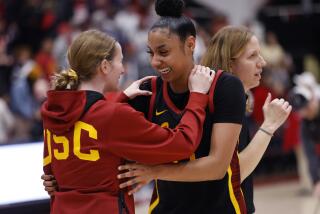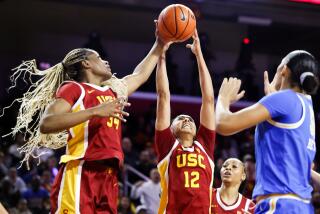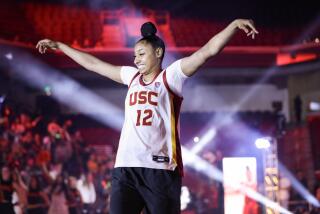USC’s Bennie Boatwright is ready to return to the court after adjusting to life off it
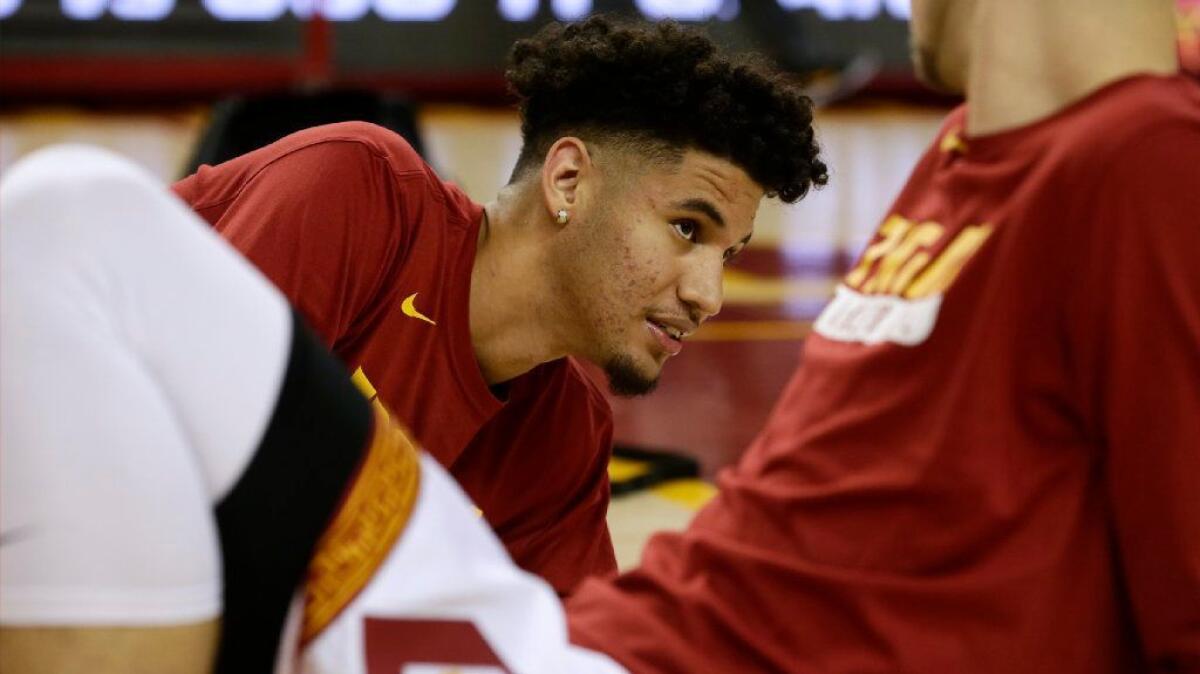
At the end of a long day, Bennie Boatwright slips into basketball shorts and jogs out through the tunnel to the Galen Center floor, like he does before every home game.
“Man, they got the lights off,” he says.
It’s 10:03 p.m. on the eve of USC’s biggest game of the season against rival UCLA. As his teammates rest, watch film or just hang out, Boatwright is alone at the arena, working to come back from a severe sprain to the medial collateral ligament in his left knee.
So he begins another late night of work under the glow of two small spotlights, which illuminate him as if he was on a stage.
The rehearsal is needed. At one point, all but one in a long succession of three-point shots from the corner clang off the rim.
“That light is right in my eyes,” he says, laughing.
By the time he reaches the center of the arc, away from the glare, he is peppering the net. He makes 10 in a row … 20 … 30 …
USC’s season started with more promise than it had in years, but the injury to Boatwright, a 6-foot-10 forward who can dribble, run and shoot like a guard, changed its trajectory.
After missing the first two games with a different injury, Boatwright played four games and was barely three minutes into a fifth on Nov. 30 when a University of San Diego defender bumped his leg as he was jumping.
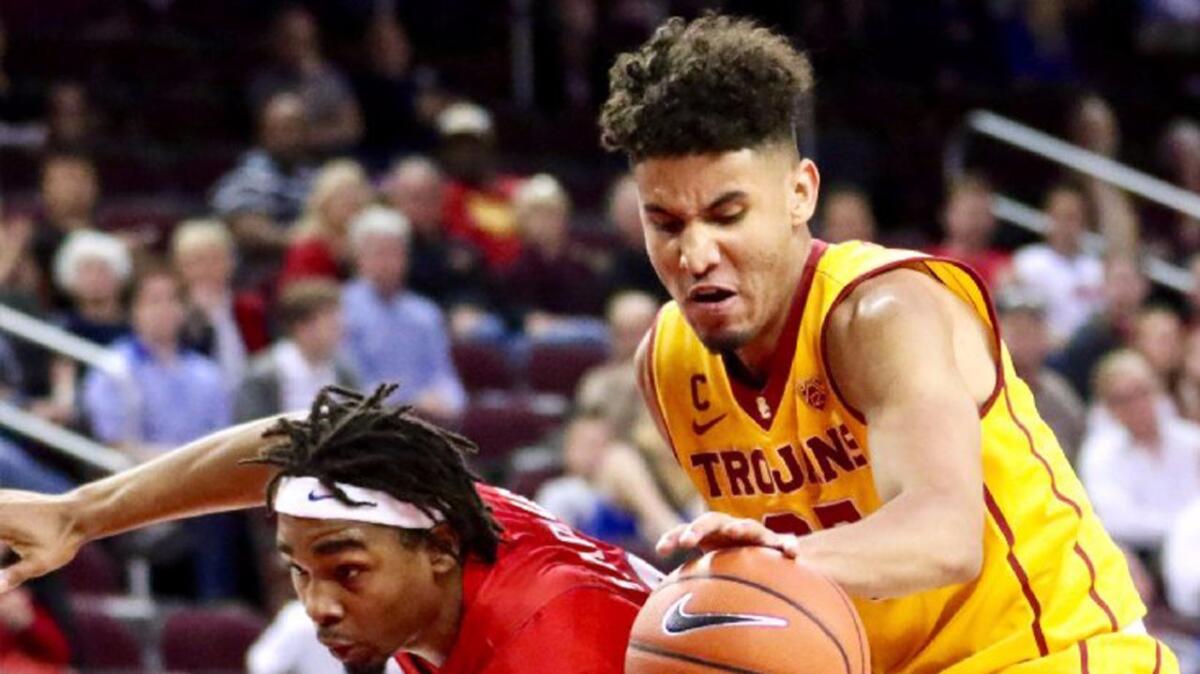
“It felt like my knee was about to collapse in, my leg was about to collapse in,” Boatwright says. He thought: “I’m done.”
He was diagnosed with a Grade 2 sprain, a partial tear. He was expected to miss six to eight weeks. It’s already been nine. He has missed 15 games.
At 18-4 overall and 5-4 in Pac-12 Conference play, USC has survived without him by using four-guard lineups whenever possible. Several of those victories have been ugly.
Without Boatwright to space the floor, USC’s offense isn’t nearly as dynamic. When the Trojans lose, Boatwright’s injury often is mentioned in the game story as a key factor.
His absence is felt acutely, USC Coach Andy Enfield said, when the Trojans face power forwards such as UCLA’s TJ Leaf or Arizona’s Lauri Markkanen.
USC plays Washington in Seattle on Wednesday, and Boatwright is hoping his strange sort of limbo — 17-hour days shuffling between classes, practices and rehabilitation — ends then.
Coaches made sure to keep him involved in everything but contact drills, but he still occupied an awkward position, a key member of the team who couldn’t always feel part of the team.
Most of Boatwright’s days beginaround 8 a.m., when he wakes and heads to class. USC typically begins pre-practice film work at 2:30 p.m., but Boatwright arrives early to work with the team’s athletic trainer, Jon Yonamine, who massages the injured knee, helps him stretch and takes him through range-of-motion exercises.
“Average day, we’ll do — with everything — about an hour, hour and a half,” said Yonamine, who works with Boatwright every day.
On the day before the UCLA game, Boatwright finishes practice, showers and emerges from the locker room just before 6 p.m.
He’s in the line for food at training table when a woman he hasn’t met stops him and asks, “Are you out of rehab?”
“Yeah,” he says. “It feels better every day.”
At his table, after he crosses himself and begins to eat, he says in a low voice, “I give the same answer every time.”
Being injured for such a long stretch is new for Boatwright. When he was in eighth grade, a doctor put both of his legs in casts to ease the pain of a prodigious growth spurt, but he’d taken that year off to train anyway. Otherwise, he’s never been sidelined for an extended period. He’s not sure how to feel.
“Sometimes,” Boatwright says between bites of mac and cheese, “I’d rather stay home and watch the game. Because being in the arena and seeing the crowd and the players talking mess, it gets me excited.”
Boatwright has 90 minutes of tutoring after practice three days a week. However, this day he has off, so he can go home and nap.
His apartment is a short walk from the arena. There is a bulky knee brace in the corner of his bedroom and a basketball sits by the foot of his bed. In the days after the injury, when he couldn’t run around a court, he worked on his follow-throughs in his room, snapping the ball in the air with his wrist.
“I spent a lot of time in this room reading and learning about myself,” Boatwright says.
Boatwright didn’t travel for USC’s most recent trip, to Utah and Colorado. He watched the games on television with his girlfriend.
“It’s really weird,” he says. “It’s just like, I want to be out there, knowing I can help the team win.”
He shrugs, then says softly to himself: “I need to get back out there.”
Boatwright wants to be back at the Galen Center by 9 p.m., but he forgets to set his alarm. He wakes up at 9:15 and begins a groggy walk back to the arena. When he leaves, roommate Chimezie Metu has his door closed and the lights off.
Boatwright does much of the sports-related rehabilitation work with his own trainers from DAG Athletic Group. He began working with them earlier in the season when back spasms made it hard to get out of bed. Every night, he works out, either alone or with trainers Dave Daglow or Sean Mann. On game nights, when the gym is in use, Boatwright returns afterward to shoot by himself.
DAG’s philosophy is that modern training techniques can often lead to injury, so they work with Boatwright to both strengthen his knee and realign his body for long-term benefits.
“He has done a lot of hard work, beyond most kids that we’ve worked with,” Mann said.
That can get tedious. Boatwright groans when he walks back into the locker room.
“This is the hardest thing about training,” he says. “The foam rolling. It’s so painful, and you’ve got to stay on the parts that hurt the most to get it to loosen up. Stretching and this are everything.”
He sets up a small speaker on the floor of the locker room, bumps 50 Cent and J. Cole and fetches the roller. Before he can start, his phone buzzes.
“Dad,” he says, “I’m gonna call you tomorrow. I’m about to work out.”
“No, I’m about to get in on my own.”
“I’m OK.”
“No, they didn’t want me in there today. They were doing UCLA stuff.”
Boatwright’s father, Bennie Sr., said his son usually vents only to him. Boatwright Sr. is a Los Angeles Police Dept. sergeant. He works the graveyard shift so he can see his kids off to school and get them to practices. (Bennie’s younger brother, Daniel, a 6-7 high school sophomore, is also a college basketball prospect.)
Boatwright says he’s not thinking about what the injury might mean for his NBA future. But sometimes, Boatwright Sr. said, his son will get frustrated and call around 1 or 2 in the morning.
“I’m not getting better,” he might say.
Now, about halfway into his rolling and exercise routine, he’s in better spirits.
“Whoo, I’m glad I got up!” he shouts.
After 30 minutes, he is ready to go shoot.
Later, he finds a seat on the side of the bench closest to the scorer’s table.
It’s 10:55 p.m., and he knows he’ll be stretching and foam-rolling in his apartment until around 1 a.m., so he savors this quiet moment. The only sound comes from his speaker and from the breathy whir of the arena’s ventilation system.
“I might make a cameo tomorrow,” he says. “Play about 10 minutes. Make about seven threes. It would be good.”
He pauses.
“I wish,” he says.
Follow Zach Helfand on Twitter @zhelfand
More to Read
Go beyond the scoreboard
Get the latest on L.A.'s teams in the daily Sports Report newsletter.
You may occasionally receive promotional content from the Los Angeles Times.
